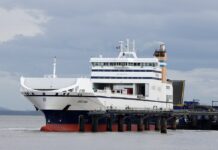While the UK’s eventual exit from the European Union may be several years away, there are growing concerns among hauliers over how their businesses will be impacted, not least issues surrounding customs controls.
And with the prospect of only the Irish border separating Northern Ireland and the rest of the UK from Europe, concern about the future has also been expressed by exporting companies in the Republic who have been trading with the UK for many, many decades.
The Road Haulage Association’s Chief Executive Richard Burnett says the British government will have to ensure fluidity will be maintained through the ports for the trucks that provide a vital trade service.
“Should the UK exit the single market and the customs union, it is clear that HM Customs will need to have significantly greater resources than at present. We will have to have the ability to clear customs without delay, 24/7. The Customs resource, as it stands, quite simply would not be able to cope,” he says.

“We are calling on the government to establish a working group to scale up Customs resources in time for Brexit. It should include representatives from the international freight industry to ensure confidence that we will be ready for the change. It is essential for supply chains in manufacturing, food distribution and retail that HMRC has sufficient resources to cope from Day 1 with the increased volume.
“Leaving the single market and customs union will inevitably add a degree of administrative cost. Far more damaging, however, would be if the supply chain slowed down as a result of an HMRC logjam.”
FTA Priorities
Meanwhile, the Freight Transport Association has drawn up a five-point plan to ‘keep Britain trading.’ It has proposed five priorities for customs and border arrangements.
Deputy Chief Executive James Hookham, who has outlined the issues to the Home Affairs Committee in Parliament, said avoiding costly delays was crucial – especially if Theresa May’s vision of “tariff-free and frictionless” trade cannot be achieved.

“Hopefully, there will be ‘frictionless trade’ between the UK and EU, but if there isn’t, or a prospect there won’t be, then these are the key issues for FTA members. We already know the impact of port delays – just one hour’s delay adds £15,000 cost to the road haulage industry – so a streamlined process is vital,” says James Hookham.
“Shippers, forwarders and transport operators in the UK have been used to open borders in Europe for 24 years so it’s going to take time to adjust, it can’t just change overnight. A smooth transition will ensure that Britain’s trade with other EU countries – both in and out – isn’t compromised,” he said.
Irish Exporters
The Irish Exporters Association (IEA) has also welcomed a keynote address by British Prime Minister Theresa May outlining the objectives of the UK going forward in negotiations on exiting membership of the European Union, ahead of triggering Article 50 later this year.
Simon McKeever, Chief Executive, Irish Exporters Association, commented: “Negotiating a free trade agreement with the EU without membership of the single market will be challenging. We at the IEA look forward to seeing solutions to these objectives discussed at an EU level and the trade deal that is negotiated swiftly. We have been trading with the UK for 1,000 years and we will continue to have a strong bi-lateral trade relationship with it, albeit with potentially more costs and complications.”
More in the next print issue of Export & Freight















